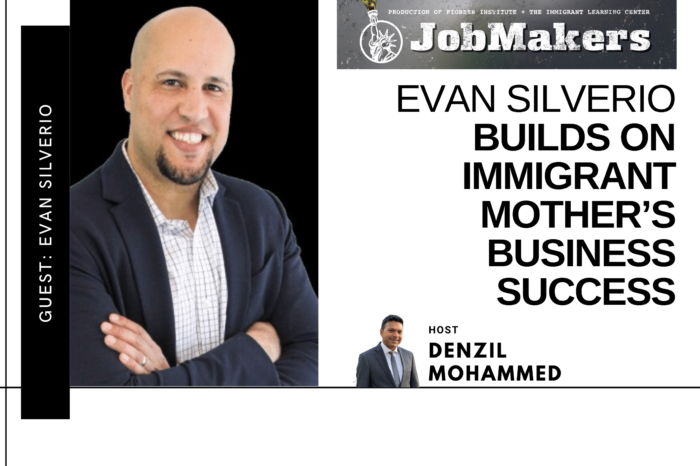Evan Silverio Builds Upon Immigrant Mother’s Business Success
/in Economic Opportunity, Featured, JobMakers /by Editorial StaffThis week on JobMakers, host Denzil Mohammed talks with Evan Silverio, child of immigrants from the Dominican Republic, President and CEO of Silverio Insurance Agency, and founder of Diverse Real Estate, both in Lawrence, Massachusetts. With the example set by his mother, who founded the agency, Evan has achieved success, despite getting into real estate during a housing bust. Evan has since purchased nearly 100 properties across the commonwealth. He describes the examples set by his immigrant mother and grandfather, and how that shaped not just his approach to business but also giving back to the community that nurtured him, as you’ll learn in this week’s JobMakers.
Guest
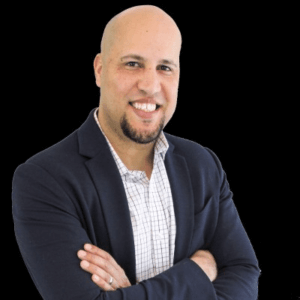 Evan Silverio is the owner of Silverio Insurance in Lawrence, MA. He began working as a loan officer with Wells Fargo Home Mortgage after college. Four years later and while continuing to work as a loan officer, Evan joined his family’s business as a licensed Property and Casualty insurance agent. In 2009, Evan created Diverse Real Estate LLC: an entity used to buy, repair, sell and rent real estate property. Over the years, Evan managed to more than quadruple the insurance agency’s book of business while at the same time purchasing over 90 properties as a real estate investor. Evan also expanded the agency by adding another location in Haverhill, MA in 2018. In December of 2019 Evan purchased the agency from his parents and took over as President/CEO. In January of 2020, Evan also purchased the reputable Woodcome Insurance Agency, in Leominster, MA. Outside of his career, community service has always been high on Evan’s list of priorities. Dedicating time and donating to non-profits and charitable events has always been common practice by Evan and his family. In 2001, He co-founded The BEYOND Scholarship fund that assisted with financial burdens for students looking to enroll in private high schools. The fund has awarded nearly $50,000 in scholarships. Evan served three years as the Chair of the Lawrence Redevelopment Authority and is currently on the Executive Committee of the Lawrence Partnership. He graduated from Wheaton College in Norton, MA, with a bachelor’s degree in economics.
Evan Silverio is the owner of Silverio Insurance in Lawrence, MA. He began working as a loan officer with Wells Fargo Home Mortgage after college. Four years later and while continuing to work as a loan officer, Evan joined his family’s business as a licensed Property and Casualty insurance agent. In 2009, Evan created Diverse Real Estate LLC: an entity used to buy, repair, sell and rent real estate property. Over the years, Evan managed to more than quadruple the insurance agency’s book of business while at the same time purchasing over 90 properties as a real estate investor. Evan also expanded the agency by adding another location in Haverhill, MA in 2018. In December of 2019 Evan purchased the agency from his parents and took over as President/CEO. In January of 2020, Evan also purchased the reputable Woodcome Insurance Agency, in Leominster, MA. Outside of his career, community service has always been high on Evan’s list of priorities. Dedicating time and donating to non-profits and charitable events has always been common practice by Evan and his family. In 2001, He co-founded The BEYOND Scholarship fund that assisted with financial burdens for students looking to enroll in private high schools. The fund has awarded nearly $50,000 in scholarships. Evan served three years as the Chair of the Lawrence Redevelopment Authority and is currently on the Executive Committee of the Lawrence Partnership. He graduated from Wheaton College in Norton, MA, with a bachelor’s degree in economics.
Get new episodes of JobMakers in your inbox!
Read a Transcript of This Episode
Please excuse typos.
Denzil Mohammed:
I’m Denzil Mohammed, welcome to Jobmakers
Denzil Mohammed:
In report from the immigrant learning center, titled adult children of immigrant entrepreneurs. It was found that children of immigrant business owners tended to work careers that helped people social work, healthcare education, rather than entrepreneurship makes sense. They’ve seen how much effort it takes to run a business in a new country while trying to learn the language laws and customs. At the same time. In fact, the report found that the parents often dissuade their children from following the path they chose for Evan Silvio, child of immigrants from the Dominican Republic, president and CEO of Silvio insurance agency and founder of diverse real estate, both in Lawrence, Massachusetts, he bit the bullet. And with the example set by his mother who founded the agency achieved success, eventually getting into real estate during a housing bust, wasn’t easy, but just like the everance his mother embodied Evan stuck with it and has since purchased nearly 100 properties across the Commonwealth. Evan describes the example set by his immigrant mother and grandfather and how that shaped, not just his approach to business, but also his approach to giving back to the community that near kind of like those other children of immigrant entrepreneurs. I mentioned, as you learn in this week’s job makers,
Denzil Mohammed:
Evan Silverio, president CEO, Silverio Insurance Agency, and manager of Diverse Real Estate, welcome to the Jobmakers podcast. How are you?
Evan Silverio:
Thank you. Thank you so much, thank you for having me.
Denzil Mohammed:
So tell us a little bit about your businesses and also perhaps tell us a little bit about the things that matter most to you as a professional and an entrepreneur.
Evan Silverio:
My mother was, you know, extremely intelligent, hardworking, fearless individual. I myself and two older sisters that were born here, you know, it’s interesting. She gave me the name, Evan, because she liked the name, but because she thought it was going to be easier on me in my transition in the United States. Right. But funny enough, a lot of people find it confusing. They call me Kevin. So didn’t go as as planned. My parents were strict. They were also very aspirational coming from another country indirectly, I learned a lot through their own struggles as immigrants long working hours failing out at a lot of business, different business ventures navigating the school systems helping family with immigration paperwork. I remember a story about my sister my older sister going to school. And my mother really had to fight for her, for them to accept her in the school system and not put her in a Spanish speaking class.
Denzil Mohammed:
Like the English language program or something.
Evan Silverio:
Yeah and I remember that being a huge struggle. And eventually, you know, she put up such a fight that they allowed her to participate and my sister did fine and she excelled. So it was interesting. But for us, it was normal, we’re around a lot of immigrants, so it made it even that much more normal.
Denzil Mohammed:
So you spoke a little bit about your mother and I think you alluded to her determination and her perseverance in the situation with your sister at school. Tell us a little bit more about your mother. She is an entrepreneur, a community leader. She even ran from Mayor of Lawrence. That is incredibly cool. And incredibly, as you say, aspirational, tell us more about her.
Evan Silverio:
Yeah, like I mentioned you know, when, when I think about my mother just intelligent, hard work and fearless, but also funny, passionate, you know, bighearted I think, I think she spent most of her life making sure that everyone else was okay. And that’s exactly how she formed her business and why she gave dedicated long hours to the community, her church, her family, right. Her business was basically established because she was helping friends and family fill out paperwork do translations immigration consulting,then after that it leads to taxes and eventually to insurance. And it was more out of her dedication to her community that she also found a way to monetize it and say, okay, well, I need to also run a business. So,there has to be some fees associated with that. Ubut it wasn’t about the money either because most of our time through the community was volunteer work, right. City counselor, or running for mayor and, and saying, you know, we’re gonna do, or her time on the boards,umore volunteer work than anything.
Denzil Mohammed:
I do want to make a point that, you know, she started these successful businesses here. And as you say, it indirectly affected and improved the community. But she would not have been able to start her own business back in the Dominican Republic if she were living there, right?
Evan Silverio:
The opportunity to help other people who really needed someone like her, a voice, a representative of sorts. And I think, you know, she used all of the skills that she, she had and, and, and really shined being here in particular in Lawrence. But I think the type of person my mother was, she would’ve been successful in the Dominican Republic.
Denzil Mohammed:
So let’s turn it over to you now tell us about your real estate business that you started in 2009 while still in your twenties. What has that been like and how do you see this business growing in the future?
Evan Silverio:
Yeah, the real estate business is just essentially myself investing in real estate. So prior to jumping on board to the family business, I was a loan officer for a total of nine years, I think, four years before jumping on board. And then while I was doing insurance, I was also continuing the loan officer career. And the reason being is I just needed the money. Right. when my mother came and asked me to jump into the family business and she couldn’t afford much, right. So I said, okay, let me, you know, come on board. And, and, and I’ll continue doing mortgage as best I can with the same amount of time through the through mortgages and through being a loan consultant I just recognized real estate a little bit.
Evan Silverio:
I could understand it a little bit and I decided, you know, what I think I can throw my hat in the ring and, and try to make some money in real estate. And my first two investments failed. They were terrible failures. And so, yeah, so it was pretty interesting. It was during the real estate boom and bust. And, and I got caught with some real estate in my hand, but for some reason I said to myself, I still still believe, you know, that this is a good time to invest. So while everybody else was kind of back pedaling, I got back on the horse, started investing again. And,it was hard, you know, you have to sacrifice, you have to make sure you do good by a lot of people.
Evan Silverio:
You know, as I mentioned earlier, it was a lot of hard money lending in order to get some investments in but the reason that I that I thought it was interesting, was it, my reasoning kept on changing over time. Initially it was, you know, if I can just get a property to pay for my auto loan, that’d be great. And then it said, well, if I could do that, I can get a property to pay for, you know, wherever I was gonna live. And that would be great. And then it just kept on going and snowballing and you know, and a hundred properties later, you know, you change it and say, well, passive income. It has a retirement plan. There’s booming equity. And now it’s funding certain acquisitions for the insurance agency. So it’s, it’s kind of working out well.
Denzil Mohammed:
Wow. I like how that it balances out with the insurance agency too. And as you say, a hundred properties, that is incredible. So you spoke a lot about you and your mother’s community involvement and you know, the model of her business, helping people with immigration forms and taxes and venturing that into a business, monetizing it your involvement today stretches from the Lawrence redevelopment authority to a scholarship fund you started with Grammy-winning producer and Lawrence native DJ Buddha. So tell me what is the guiding principle behind this kind of work that you do?
Evan Silverio:
Honestly, I think it just comes from this responsibility to give back, to contribute, the scholarship fund, as you mentioned with DJ Buddha, he was a Lawrentian such as myself. He went to Central Catholic with me and I think post graduation once we had some money in our pocket we had a clear understanding that the reasons we were allotted certain opportunities was because of the opportunities that we were given to attend, you know a higher education than the high school level. And we wanted to give other people that same opportunity. We think that really was a pivot a game changer for us in our younger years. And and if other people can have that same experience and we can make that same pivot for other people, then, then we were going to put some effort into that.
Evan Silverio:
But I think it really down to the responsibility to contribute and give back where, and when we can. I think now where I have less time on my hands I know that I still have in the back of my head because part of the whole business plan be it with real estate or be it with the insurance, is to make sure that successful enough, that we can continue to, to contribute to those in the private sector, nonprofit or just community, a advocates that that align with our belief system. And hopefully we can contribute because they need capital to do what they do. So if we can be a source for them then, then we’ll be happy to be <affirmative>
Denzil Mohammed:
As you talk about community development. I, I really think deeply of Lawrence, which of course, you know, had all the mills and it had that sort of boon, and then it sort of busted, and it became a place where immigrants moved in because the rents were cheap. I recall your mother saying that it wasn’t until Latinos were elected to the city, a council, that things really began to change for minorities in terms of access to help and growing their businesses and things like that in terms of economic development in Lawrence, where do you see Lawrence headed and what changes would you like to see, or what changes would you like to, to help bring about?
Evan Silverio:
Yeah, Lawrence is definitely evolving. And I think that you’re looking at the tail end of some great things, right. Lawrence 15, 20 years ago is a totally different Lawrence. And I think I think we have a lot of communities asking our local leaders right now. How, how did Lawrence do it? I was just on a call the other day with, I think it was Chicopee asking and picking our brain on, Hey, you know, we, we saw everything that you were able to do, you know, can you give us some, some pointers, right. And, and what’s funny is the pointers really come down to that. You really just have to have enough people invested who want it bad enough to roll up their sleeves, to try to get the work done, right? Whatever changes and the better the plan than, than the better, the more the buy-in.
Evan Silverio:
But if you don’t have the people it’s gonna be a very difficult thing to move. The city in Lawrence, we have that we have private, we have public have nonprofit, all collaborating and working together. This has been the fundamental difference. There is no one person or entity who’s done it all. It’s a combined effort over a long period of time. So I think a lot of people say, oh, wow. Overnight, no, it’s, <laugh>, it’s, you know, 30 years in the making. So it definitely, it takes a village but we need more villagers to take pride and to participate. We can’t afford to wait for someone else to make these changes for us. We need to be the change.
Denzil Mohammed:
And it’s safe to say that immigrants, business owners, workers, community members are part of that change. In Lawrence, I was, I remember talking to Theresa Park on this podcast and she was very proud of the work that she was able to accomplish in Lawrence, which was incidentally, the place where her Korean family moved when they first came to the us. Finally you said your, you know, your grandfather moved from the Dominican Republic to the us and eventually sent for your mother. It wasn’t an easy task for either of them. And, you know, your mom walking around with dictionaries at school, and I have that vivid memory in my head, but she stuck with it. And here you are reflect on those risks that they took and compare it perhaps to the risks that you take as an entrepreneur.
Evan Silverio:
Cause I, I think about, about it off, I think about it off in the risk that they take. And I think a, a lot of what I’ve done has been based on thinking about in retrospect, the sacrifices that were made by all of those that came before me. I think I mentioned that earlier. I think about a lot of the risks that I’ve taken as an investor, you know, the hard money land, the, the, the large risks that I’ve taken. And I, by far cannot compare that to the risks of my grandfather. My mother, my father, who came here you know when I think about it, I think it’s because I still live in my comfort zone and my choices be it co college or career, we all closely <affirmative>, you know relative to where my family is and, and what I thought my options were.
Evan Silverio:
But just having those options, just having options in general, I think a lot of people take for granted, right? You don’t have to be right about your options, but you still have options. Right. but their risk and, and their decisions revolved around something deeper the safety of their families to book people in better positions, that’s not so much themselves, but their, but their daughters, their sons, their, the, and, and the sons and daughters of, of sons and daughters to have more resources you know, they, they, weren’t looking to be millionaires. They, they were just looking for a better life and they risked it all to do so they came to this country with no real money no real connections and no resources. And so they got here and they, they figure it out, right.
Evan Silverio:
There was this, this myth that the country that they were going to had this stuff waiting for them. And this was still a better option than just staying put. Right. and, you know, I, I think nobody goes into something and, and takes risks and says, this is a bad idea, but let me do it anyway, everybody, the whatever risk they’re taking is because there’s some reward and, and, and something. And I think in retrospect I, myself and the reward and hopefully my kids, kids as well of all the sacrifices that they’ve made,
Denzil Mohammed:
I did not mean to exclude dad. We have to mention dad <laugh> as well. Last I’m sure that they’re gonna be young brown boys and girls teenagers, people in their twenties who perhaps consider starting their own business. What advice would you give to young body budding entrepreneurs, or what are some of the lessons that you’ve learned that you think you would like to impart
Evan Silverio:
There? Nothing builds nothing, beats out, keeping your word, you know building trust you know, those things, that’s what everything is based off of. Right. I relationships with bankers, relationship with networking people, all of that is gonna continue building. The more that you can build your trust with them and complete the task that you say you’re gonna complete. If you continue doing that, I think more people will follow you. I think more people will trust you. I think more people will invest in you and you have to be willing to take that risk on yourself and say, you’re good enough. And, and, and you’re trustworthy enough and, and don’t break, don’t break that for anything or anybody not even money. And if you keep at it, you will succeed,
Denzil Mohammed:
Not even money. I love how you phrased that. Evan Silverio, President & CEO of Siverio Insurance Agency in Lawrence, Haverhill and Woburn and sole manager of Diverse real estate, thank you so much for joining us on the JobMakers podcast. This was a lovely and fascinating interview.
Evan Silverio:
Thank you so much, Denzil, for having me and I love the podcast, and I’ll continue to keep listening.
Denzil Mohammed:
Jobmakers is a weekly podcast about immigrant entrepreneurship and contribution produced by Pioneer Institute, a think tank in Boston and the Immigrant Learning Center in Malden, Massachusetts, a not for profit that gives immigrants a voice. I am so happy that you joined us for this week’s powerful story of immigrant entrepreneurship passed down to the next gen. Remember, you can subscribe to Jobmakers on Apple podcast, Spotify, wherever you get your podcasts. And please leave us a review. I’m Denzil Mohammed. See you next Thursday at noon for another Jobmakers.
Recent Episodes:
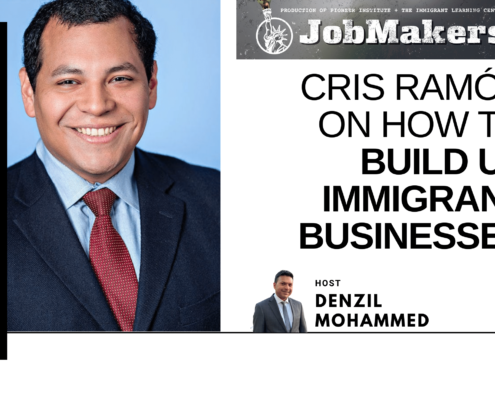
Cris Ramón on How to Build Up Immigrant Businesses
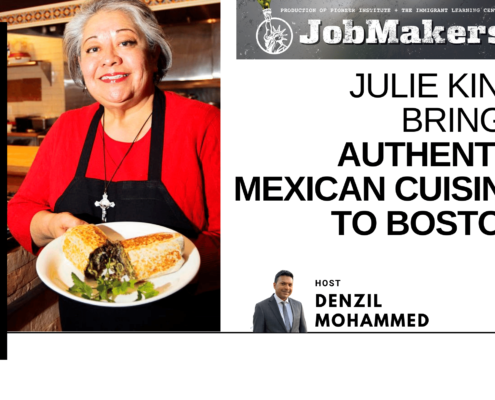
Julie King Brings Authentic Mexican Cuisine to Boston
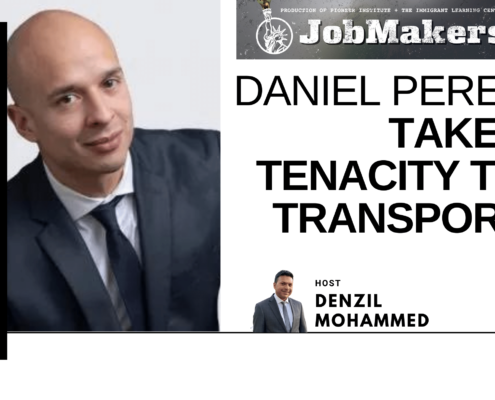
Daniel Perez Takes Tenacity to Transport
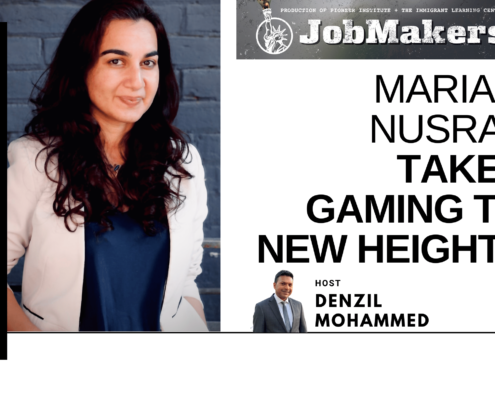
Mariam Nusrat Takes Gaming to New Heights
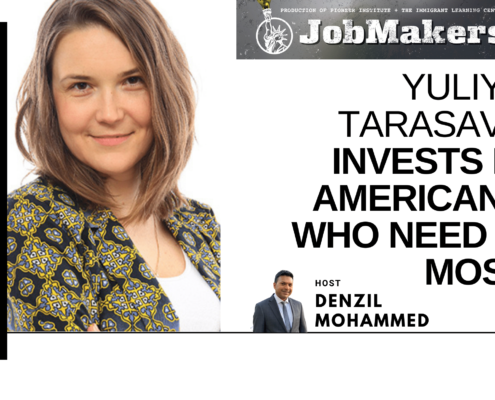
Yuliya Tarasava Invests In Americans Who Need It Most
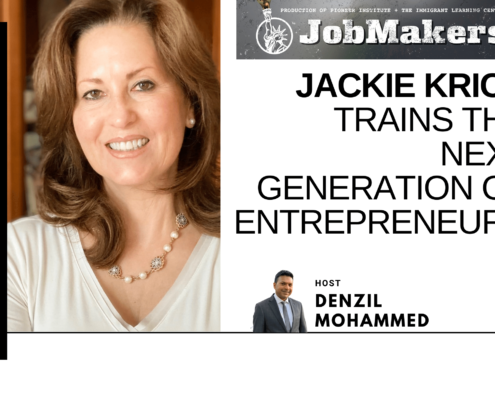
Jackie Krick Trains the Next Generation of Entrepreneurs
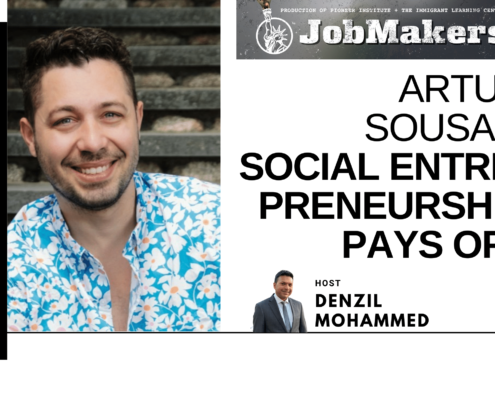
Artur Sousa’s Social Entrepreneurship Pays Off
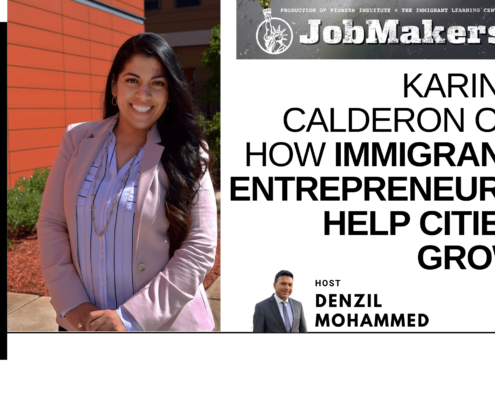
Karina Calderon on How Immigrant Entrepreneurs Help Cities Grow

